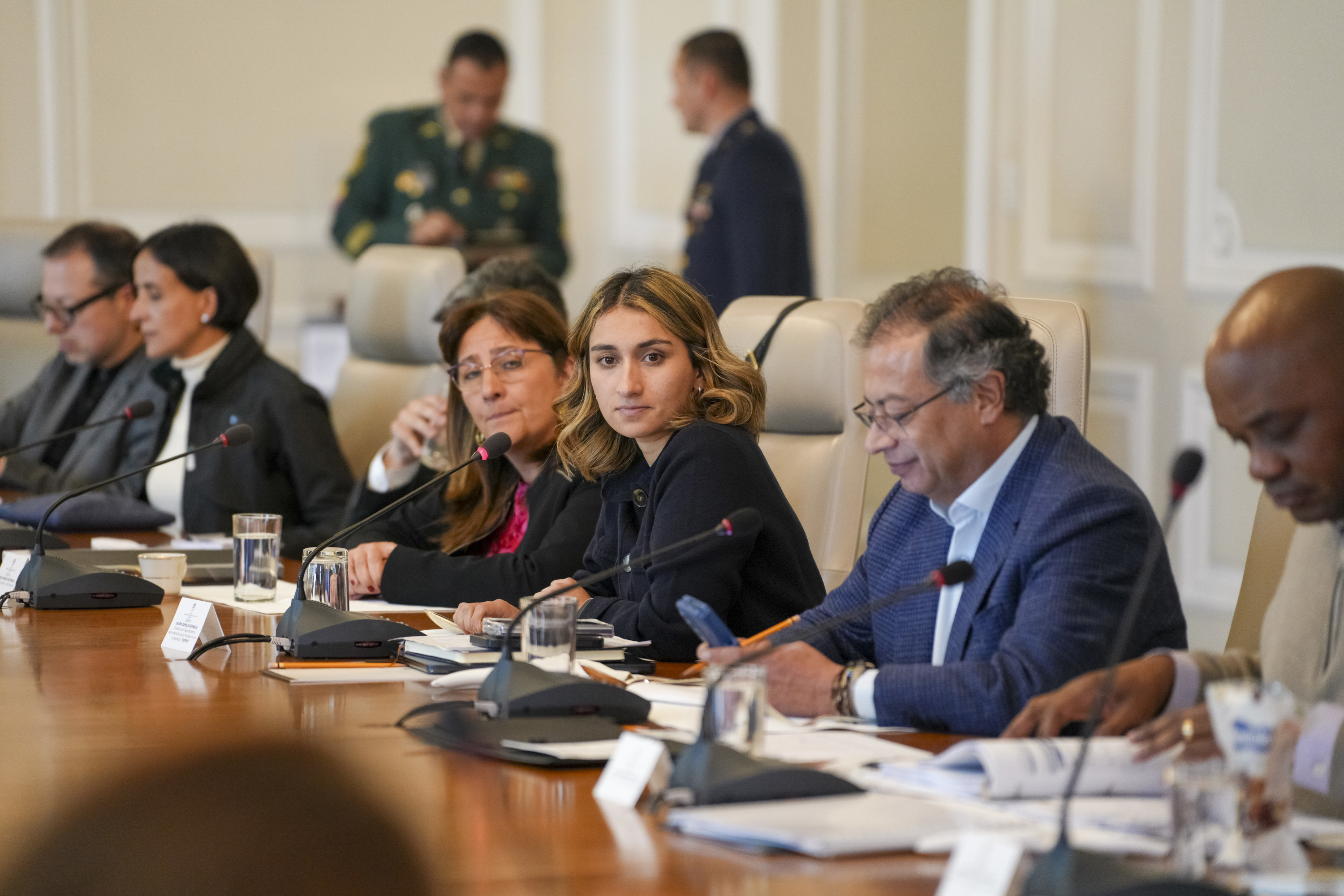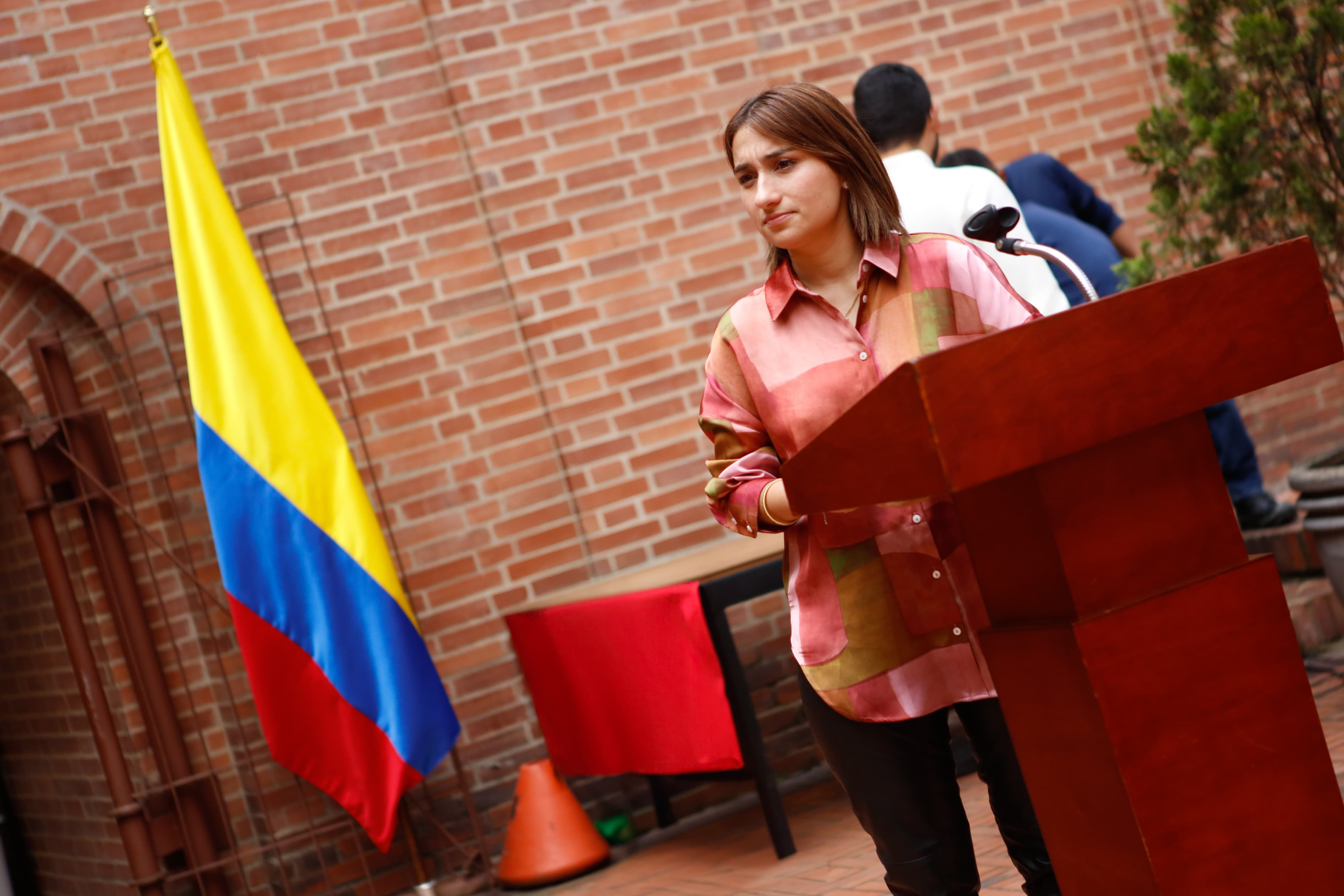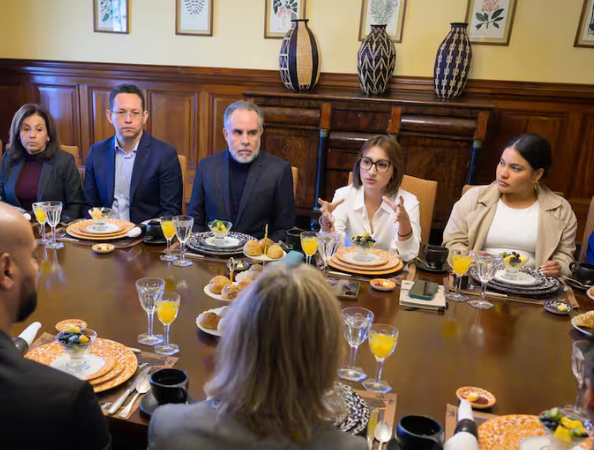Sarabia's tenure at the Foreign Ministry: five months of diplomatic triumphs, friendly fire, and disavowals

Laura Sarabia's tenure at the Foreign Ministry seemed much longer than it actually was. It was an intense five months of management that began prematurely due to the deportation crisis under Donald Trump's administration and will be marked by several diplomatic triumphs in various multilateral forums, but also by several disavowals and clashes stemming from the place where she had become one of the most powerful women in the Executive Branch: the Casa de Nariño.
"My deepest gratitude to the President. It's been three years of hard work at his side. Obviously, a significant emotional burden, but I'm leaving with a clear conscience, and above all, knowing that I tried to carry out all my duties with the utmost integrity and discipline. Above all, I am handing over my administration to the country, and I wish the new Foreign Minister Rosa Villavicencio the best of success," Sarabia said this Monday at the end of a final meeting with Gustavo Petro.

Laura Sarabia and President Gustavo Petro at a cabinet meeting. Photo: Presidency
The former head of state's right-hand man has decided to leave the government due to his disagreement with the decisions being made regarding the issuance of passports . While Sarabia believes that Portugal and the National Printing Office are at a difficult time implementing the new model in September and believes a new extension with Thomas Greg is necessary to avoid a major crisis, the president and his chief of staff, Alfredo Saade, refuse to back down.
"Through a foreign policy committed to human rights, peace, regional integration, culture, inclusion, and climate action, the Foreign Ministry has generated concrete and transformative results," the Ministry of Foreign Affairs emphasized Sarabia's administration in a statement that felt like a kind of farewell.
Diplomatic achievements 
Laura Sarabia resigned from the Foreign Ministry on July 3. Photo: Foreign Ministry
Sarabia's greatest achievements during his time in the Foreign Ministry came in multilateral forums . During this period, he secured the approval of two resolutions at the United Nations: one at the Commission on Narcotic Drugs in Vienna, Austria, proposing the creation of a group of experts to examine the current global drug regime; and the other at the Commission on Crime Prevention and Criminal Justice on combating the smuggling of commercial goods.
Likewise, thanks to various efforts, a historic appointment was achieved at the Organization of American States (OAS): Ambassador Laura Gil was elected as the first female Assistant Secretary General. Colombia was also elected as a non-permanent member of the UN Security Council (2026-2027) and to the Food and Agriculture Organization of the United Nations (FAO) Council.
The Foreign Ministry also highlighted its international leadership by assuming the pro tempore presidency of CELAC, which included a summit with China in May. The Third Colombia-CARICOM Ministerial Summit was also held in the country.
On the bilateral front, the normalization of relations with Peru was completed with the appointment of ambassadors to both countries. And more than 2,500 Colombians deported by the United States returned to the country on Colombian Aerospace Force (FAC) flights.
" She had her start with the deportation crisis, but the de-escalation cannot be attributed to her but rather to the efforts and relationships with key US figures that Murillo, the Colombian ambassador, and others had ," says analyst Angélica Rodríguez.
For internationalist Camilo González, although Sarabia attempted to create a favorable environment—for example, by reaching out to the business community—for bilateral relations with Washington, he failed to contain the tension.
The disavowals 
Alfredo Saade with President Gustavo Petro at a meeting on health. Photo: Presidency
Now, Sarabia will be left with a bitter taste in her mouth from several episodes of disavowals from President Petro, who, in this final stretch of his administration, no longer trusted her as much as he once did.
The elections in Ecuador demonstrated a disconnect between the two. While Sarabia recognized Daniel Noboa as the winner, the president overruled his foreign minister 18 hours later, sowing doubt about the result and demanding the publication of the electoral records.
But one of the strongest disavowals was the one generated by the convening of the Advisory Commission on Foreign Relations to discuss Colombia's possible accession to the Silk Road. After the summons became known, the president canceled it in public: " That's where they convened the Advisory Commission. No, I am the head of Colombia's Foreign Relations, as the Constitution says. We are going to speak with Xi Jinping face to face, not on our knees, and we will address current issues ," he clarified.
"There they summoned the Advisory Commission. No, I am the head of Colombia's Foreign Relations, the Constitution says.
The final straw was the passport issue. After announcing that a third emergency would be filed with Thomas Greg, President Petro delegated the task to the controversial Pastor Saade (which is essentially a Foreign Ministry responsibility), who halted the emergency, criticizing Sarabia for allegedly not "taking the necessary actions" to implement the new model. All of this while the outgoing minister was abroad on an international agenda.
"Despite the conflictive relationship between the government and Thomas Gaviria, the chancellor, in a very moderate and even balancing act, managed to maintain operations with Thomas Greg to avoid the risk we face of many Colombians losing their passports," Camilo González noted.
Friendly fire 
Meeting on passports. Photo: Ministry of Foreign Affairs
Likewise, Sarabia had to deal with so-called "friendly fire" from the first days of his tenure as head of diplomacy. Several cabinet members, starting with Vice President Francia Márquez, took advantage of the first televised cabinet meeting to criticize Sarabia's leading role and the way he has supposedly isolated the president from his most loyal followers.
"I don't agree with Laura Sarabia's attitude toward us in this government, toward me, who has had to tell her to respect me, since I am the vice president," the vice president stated at the meeting. Gustavo Bolívar, Susana Muhamad, and Alexander López joined Márquez in criticizing her.
However, what wore Sarabia down most was his cold war with Armando Benedetti . On April 15, amid a hectic schedule in Japan, Sarabia announced that he had handed over to the Prosecutor's Office audio recordings "that have not been made public" of a controversial conversation with Minister Armando Benedetti, his former mentor and now antagonist.
"Since she stopped being my secretary, I don't care what she does or says," Benedetti reacted at the time.
Although they seemed closer in recent weeks, Sarabia's inner circle was already hinting at signs of the minister's exhaustion. In one way or another, they sense an attempt was made to undermine her leadership at the Foreign Ministry, or at least make it difficult to bear.
Juan Pablo Penagos Ramirez
eltiempo





